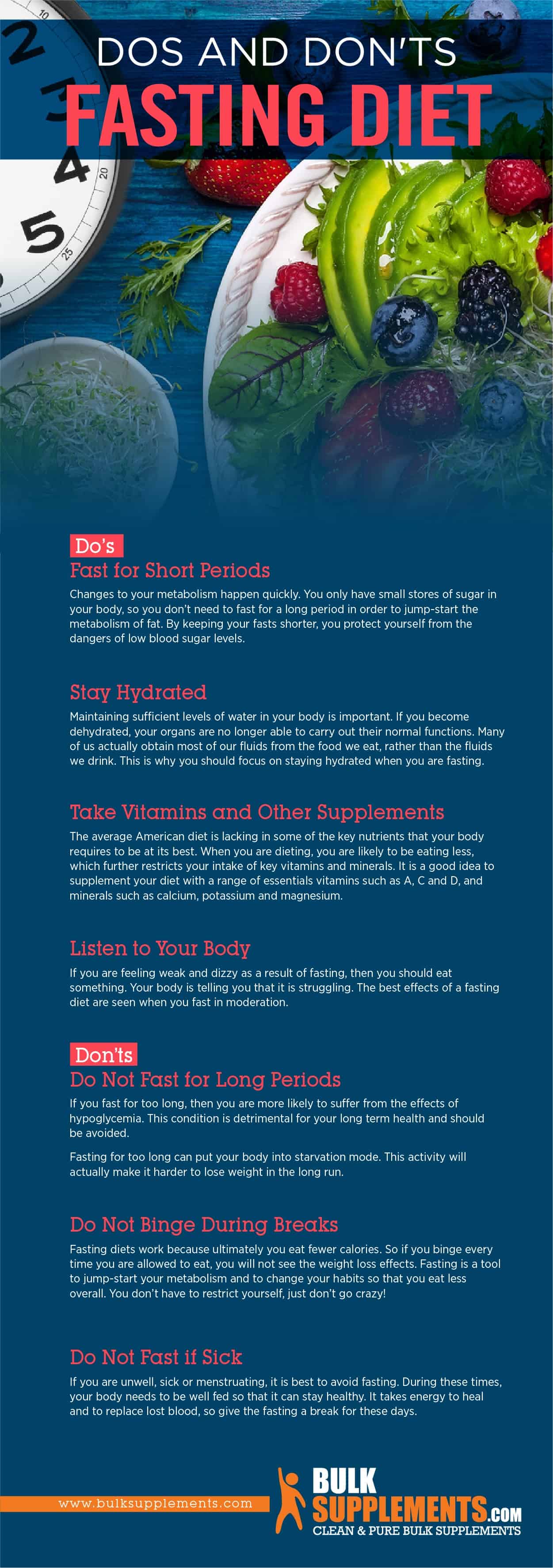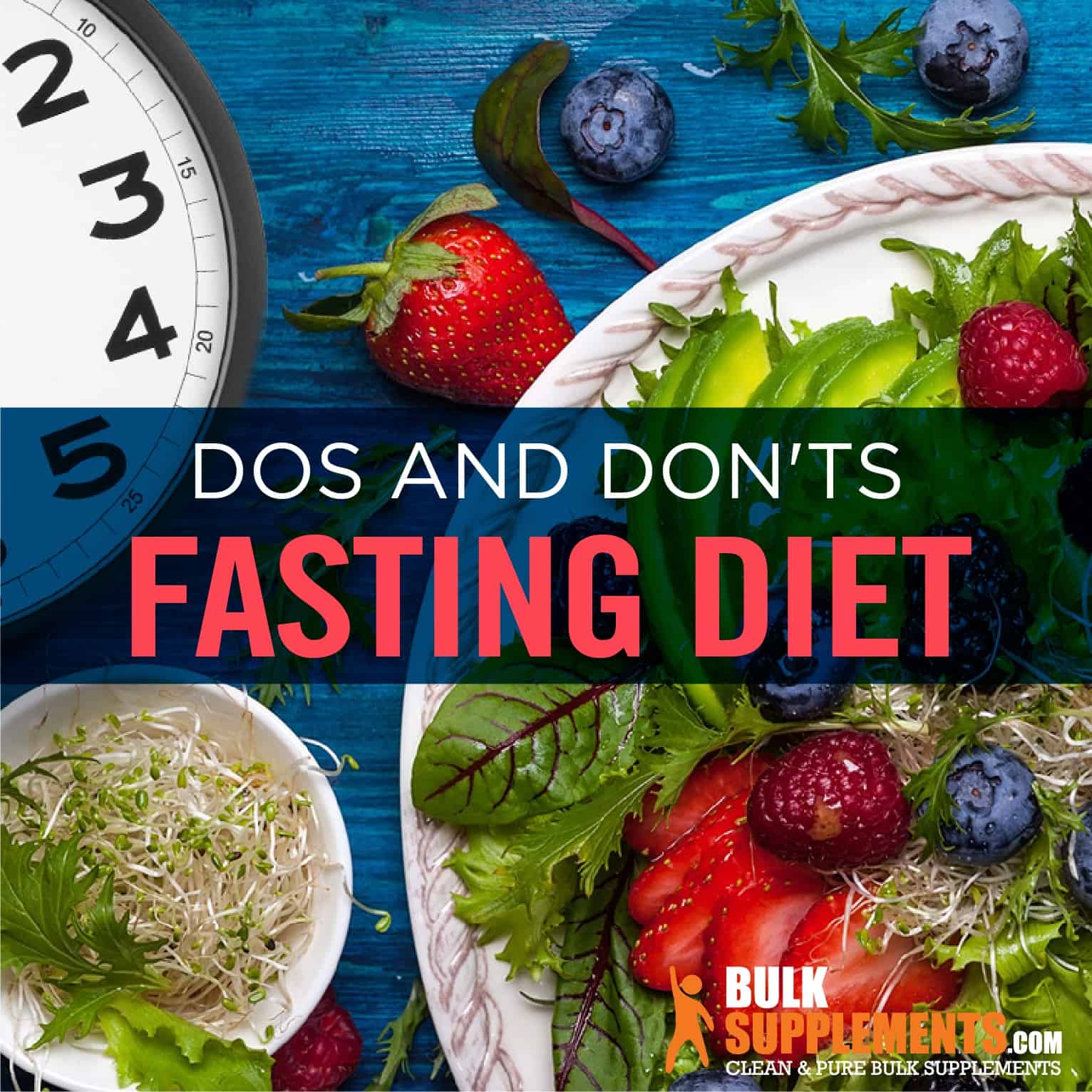What is a Fasting Diet?
A fasting diet is when you choose to not eat for a fixed amount of time. This is different from starvation in that you are not withholding nutrition for long enough to cause damage to the body.
Fasting has been around for a long time. It has been used not only as a way to lose weight traditionally, but also as a means of cleansing the body and spirit. Probably the most well-known example of fasting is Ramadan. This is a period of time where people in the Muslim community don’t eat between sunrise and sunset, so it signifies a means of showing their faith and feeling closer to God.
Fasting diets have really taken off recently. In fact, fasting diets are one of the top trending diets in the United States at the moment. As you would expect, there are many different versions of fasting diets out there. They all work using the same basic principle, but the time or the way in which you fast may differ, especially specific methods.
The proponents of fasting diets make numerous claims about their dietary wonders. If you believe everything that’s out there, you’d be tempted to believe that fasting can make you live longer and keep you safe from every disease imaginable. In fact, there are studies that show that fasting diets can attain these goals for mice, rats and worms (x, x, x). In turn, fasting diets do have some real health benefits for humans as well.
Studies performed on humans have shown that fasting diets can be effective for weight loss and as a part of cancer treatment (x, x, x, x). So if you are looking at a fasting diet as a means of losing weight or for boosting the effects of cancer treatments, science seems to validate it. However, if you’re hoping to live longer and prevent Alzheimer’s then you might be out of luck.
How Does a Fasting Diet Help with Weight Loss?
Most of the time, your body relies on carbohydrates for producing energy. On a normal day, about 50 percent of your energy comes from carbs, 35 percent from fats and 15 percent from proteins (x, x). When fasting, stored fat is used in much higher quantities to provide the needed energy for the body (x, x, x). If starvation is reached after about three days of no food, then the body takes active steps to conserve fat, so it becomes harder to lose fat (x). In sum, fasting is preferable for weight loss based on this rationale.
Increased fat burning is actually only a small piece of the puzzle, though. The biggest reason that fasting leads to weight loss is that you actually end up eating less food. Even if you are allowed to eat as much as you want between fasting, the overall caloric consumption generally decreases (x, x).
For some people, fasting can make you feel hangry (hungry-angry) (x). Often this mood is the biggest obstacle to this diet. However, over time most people overcome this mood and adapt well to the lack of food; they eventually feel less hungry over time (x, x). The lack of restrictions over what to eat the rest of the time can prevent feelings of void. These implications mean that ‘feast days’ don’t typically end up being days of overindulgence.
How Does a Fasting Diet Help with Cancer Treatment?
Cancer cells love sugar (x, x). When you fast, you quickly use up your small stores of sugar (x). During fasting, the cancer cells are severed from their fuel source. In combination with conventional therapy, fasting has been shown to be highly effective at reducing the size of tumors (x). It has also been linked to reducing the recurrence of cancer following remission (x).
Types of Fasting Diets
Intermittent Fasting
Intermittent fasting is something that we actually do. The gap between your last meal of one day and the first meal of the second day denotes your fasting period. As part of the fasting diet, you just extend this period.
One version of this diet is called the 16:8 diet: it means that you fast for 16 hours a day and are only allowed to eat during the remaining eight hours (x). For example, you might only eat between noon and 8 p.m. Within those hours, you can eat whatever and however much you want. The hours you pick don’t matter too much, so you can adjust them to suit your own lifestyle.
If 16 hours with no food sounds a bit too much, you can still see positive results with a shorter fasting period. For example, 14 or 12 hours of fasting also works. The flexibility here can allow you to tailor the diet to your lifestyle and find something that you can maintain proactively. There’s no point if you are going to indulge in many cheat days, though.
Water Fasting
Water fasting is when you only drink water for a fixed period of time (x). Generally, it is for between 24 hours to three days. If weight loss is your goal, then you should avoid fasting for more than three days. After this amount of time, your body will enter starvation mode and will begin hoarding fat stores (x).
One slightly less restrictive version of water fasting is a coffee fast. In this version, you can drink tea or coffee during your fast day. As long as your drink contains fewer than 50 calories, then it shouldn’t disrupt your fast.
Every Other Day Diet
The every other day diet is a slightly different version of a fasting diet. In this diet, you don’t have a specific period of fasting. Instead, you alternate feast days and diet days. On the diet days, you eat no more than 500 calories. On the feast days, you eat as much as you want (x).
Since you are limiting the amount of sugar you consume on the diet days, it serves to work in the same manner as intermittent fasting.
One Meal a Day Diet
This is the most extreme version of intermittent dieting. It is essentially 23:1, which means you only have one hour a day where you are allowed to eat. Because of the severe restrictions on eating, you will certainly lose weight in the short term. However, you will also increase the risks associated with long periods of fasting (x).
Eat Stop Eat and 5:2
Eat stop Eat is similar in form to the 5:2 diet. In both of these diets you have five days where you eat normally, and two days (not consecutive days) where you don’t (x).
In Eat stop Eat you fast on the two days, then you eat responsibly for the other five. There are no major restrictions, and they are not considered diet days; however, you are encouraged to think about what you eat.
In 5:2, you can eat on your two days, but are limited to 500 calories (the same as in an Eat Stop Eat diet). There are no limitations on the other five days.
Starvation Diet
The starvation diet is often linked to fasting diets. However, it is a much more extreme diet and works in a different way. Likewise, it causes different effects on the body. The starvation diet is where you consume approximately 50 percent of the calories that you need for an extended period, usually three weeks.
Following this diet will undoubtedly lead to weight loss. However, it is not healthy weight loss. The weight lost from this diet is muscle mass and even organ tissue (x); once you start eating properly again, you will put the weight back on; and if you continue eating in this way, you can suffer from the effects of malnutrition associated with anorexia.
Do’s
Fast for Short Periods
Changes to your metabolism happen quickly. You only have small stores of sugar in your body, so you don’t need to fast for a long period in order to jump-start the metabolism of fat (x). By keeping your fasts shorter, you protect yourself from the dangers of low blood sugar levels.
Stay Hydrated
Maintaining sufficient levels of water in your body is important. If you become dehydrated, your organs are no longer able to carry out their normal functions (x). Many of us actually obtain most of our fluids from the food we eat, rather than the fluids we drink. This is why you should focus on staying hydrated when you are fasting.
Take Vitamins and Other Supplements
The average American diet is lacking in some of the key nutrients that your body requires to be at its best. When you are dieting, you are likely to be eating less, which further restricts your intake of key vitamins and minerals. It is a good idea to supplement your diet with a range of essential vitamins such as A, C and D, and minerals such as calcium, potassium and magnesium (x).
With a fasting diet, there isn’t any push towards eating more healthy, so you might not be eating the extra servings of healthy foods that you might with another diet. Moreover, you need to add these key nutrients as a sensible move.
Listen to Your Body
If you are feeling weak and dizzy as a result of fasting, then you should eat something. Your body is telling you that it is struggling. The best effects of a fasting diet are seen when you fast in moderation.
Don’ts
Do Not Fast for Long Periods
If you fast for too long, then you are more likely to suffer from the effects of hypoglycemia (x). This condition is detrimental for your long term health and should be avoided.
Fasting for too long can put your body into starvation mode. This activity will actually make it harder to lose weight in the long run (x).
Do Not Binge During Breaks
Fasting diets work because ultimately you eat fewer calories (x, x). So if you binge every time you are allowed to eat, you will not see the weight loss effects. Fasting is a tool to jump-start your metabolism and to change your habits so that you eat less overall. You don’t have to restrict yourself, just don’t go crazy!
Do Not Fast if Sick
If you are unwell, sick or menstruating, it is best to avoid fasting. During these times, your body needs to be well fed so that it can stay healthy. It takes energy to heal and to replace lost blood, so give the fasting a break for these days.

Dangers of Fasting
When fasting, you are reducing your blood sugar levels, so you can suffer from the effects of hypoglycemia. This diagnosis includes symptoms such as dizziness, weakness and even in some cases constipation (x). If you experience these issues when fasting, it is advisable to listen to your body and reduce the fasting times.
Another issue that has been documented with fasting is that it has increased the risk of developing gallstones in some cases (x, x). The risk is minor, but if you have any concerns, it is best to consult your doctor before starting a fasting diet.
You should avoid fasting diets if you suffer from diabetes as the diet forces your body into a state of hypoglycemia. It is also not advisable for pregnant and breastfeeding mothers.
The Bottom Line
Fasting diets have been shown to deliver several health benefits and encourage effective weight loss. They increase your metabolism of fat and also lead you to eat less, without having to restrict what you eat. There are several different approaches, so you can tailor the diet to suit you. The best effects are achieved with short periods of fasting, and a diet that contains proper levels of water, vitamins and minerals.


